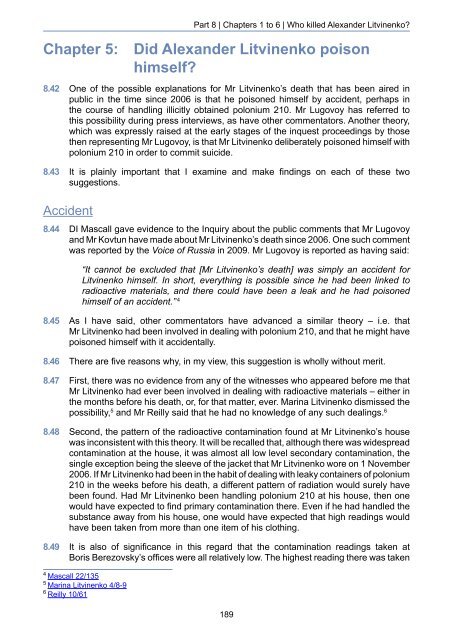The Litvinenko Inquiry
JIEp7Zyr
JIEp7Zyr
You also want an ePaper? Increase the reach of your titles
YUMPU automatically turns print PDFs into web optimized ePapers that Google loves.
Part 8 | Chapters 1 to 6 | Who killed Alexander <strong>Litvinenko</strong>?<br />
Chapter 5: Did Alexander <strong>Litvinenko</strong> poison<br />
himself?<br />
8.42 One of the possible explanations for Mr <strong>Litvinenko</strong>’s death that has been aired in<br />
public in the time since 2006 is that he poisoned himself by accident, perhaps in<br />
the course of handling illicitly obtained polonium 210. Mr Lugovoy has referred to<br />
this possibility during press interviews, as have other commentators. Another theory,<br />
which was expressly raised at the early stages of the inquest proceedings by those<br />
then representing Mr Lugovoy, is that Mr <strong>Litvinenko</strong> deliberately poisoned himself with<br />
polonium 210 in order to commit suicide.<br />
8.43 It is plainly important that I examine and make findings on each of these two<br />
suggestions.<br />
Accident<br />
8.44 DI Mascall gave evidence to the <strong>Inquiry</strong> about the public comments that Mr Lugovoy<br />
and Mr Kovtun have made about Mr <strong>Litvinenko</strong>’s death since 2006. One such comment<br />
was reported by the Voice of Russia in 2009. Mr Lugovoy is reported as having said:<br />
“It cannot be excluded that [Mr <strong>Litvinenko</strong>’s death] was simply an accident for<br />
<strong>Litvinenko</strong> himself. In short, everything is possible since he had been linked to<br />
radioactive materials, and there could have been a leak and he had poisoned<br />
himself of an accident.” 4<br />
8.45 As I have said, other commentators have advanced a similar theory – i.e. that<br />
Mr <strong>Litvinenko</strong> had been involved in dealing with polonium 210, and that he might have<br />
poisoned himself with it accidentally.<br />
8.46 <strong>The</strong>re are five reasons why, in my view, this suggestion is wholly without merit.<br />
8.47 First, there was no evidence from any of the witnesses who appeared before me that<br />
Mr <strong>Litvinenko</strong> had ever been involved in dealing with radioactive materials – either in<br />
the months before his death, or, for that matter, ever. Marina <strong>Litvinenko</strong> dismissed the<br />
possibility, 5 and Mr Reilly said that he had no knowledge of any such dealings. 6<br />
8.48 Second, the pattern of the radioactive contamination found at Mr <strong>Litvinenko</strong>’s house<br />
was inconsistent with this theory. It will be recalled that, although there was widespread<br />
contamination at the house, it was almost all low level secondary contamination, the<br />
single exception being the sleeve of the jacket that Mr <strong>Litvinenko</strong> wore on 1 November<br />
2006. If Mr <strong>Litvinenko</strong> had been in the habit of dealing with leaky containers of polonium<br />
210 in the weeks before his death, a different pattern of radiation would surely have<br />
been found. Had Mr <strong>Litvinenko</strong> been handling polonium 210 at his house, then one<br />
would have expected to find primary contamination there. Even if he had handled the<br />
substance away from his house, one would have expected that high readings would<br />
have been taken from more than one item of his clothing.<br />
8.49 It is also of significance in this regard that the contamination readings taken at<br />
Boris Berezovsky’s offices were all relatively low. <strong>The</strong> highest reading there was taken<br />
4<br />
Mascall 22/135<br />
5<br />
Marina <strong>Litvinenko</strong> 4/8-9<br />
6<br />
Reilly 10/61<br />
189


